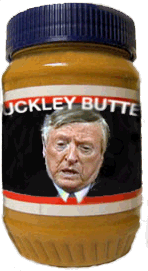"SKIPPY, and not that damned Jif. I can tell the difference"

|
|
 |
Two
words come to mind when I think of conservative William F. Buckley, who died last week at the age of 82: peanut butter.

He loved the stuff and was a true connoisseur, often saying, "If peanut butter were as expensive as caviar, it would be served at Buckingham Palace teas."
Several tributes to Buckley have mentioned this avid predilection. He himself wrote about it in his column and, memorably, a full-blown New Yorker Magazine essay in which he extolled the virtues of Red Wing peanut butter, a grocery store house brand made upstate in Fredonia, New York.
I first arrived at my knowledge of his enthusiasm in an odd, peripheral yet firsthand sort of way. Years ago, when I was an undergraduate at Georgetown, Buckley and his producers would occasionally bring his public television talk show "Firing Line" down to Washington for a few episodes.
At the end of each program, a panel of left-leaning students would be allowed to question Buckley and his guest(s), a nod to the younger generation and other political points of view but also, presumably, an opportunity for Buckley to skewer feckless opposition with his infamous wit and vocabulary.
|
|
|
I was one of those callow, opinionated kids. Two other classmates and I were booked to appear on a live broadcast with investigative journalist Seymour Hersh, who had published a book based on his Pulitzer Prize-winning expose of the My Lai massacre. After that we would tape a program for the following week, this one with three United States Marines who had served in Vietnam and said they had witnessed no such atrocities.
The other students and I prepared for the two shows as if we were cramming for midterms. Adrian Fisher, the dean of Georgetown's Law Center, even arranged for us to have lunch with Telford Taylor, the Nuremberg trials prosecutor who had just written a controversial book arguing that by post-World War II standards, some American actions in Vietnam and Cambodia were as criminal as those committed by the Third Reich.
The shows were produced from the studio of Howard University's public television station. The first, the live telecast with Sy Hersh, went off without a hitch. The dialogue between him and Buckley was interesting and in the closing segment our questions were well received and thoughtfully answered.
But in between the live and taped shows one of the producers came up to my classmates and I as we waited in the green room. He admonished us for not being "radical" enough. Apparently, it turned out, we weren't sufficiently of the bomb-throwing, anarchic breed the "Firing Line" staff hoped for in their student interrogators.
Our pride hurt, we resolved that if we couldn't foam at the mouth and threaten revolution, at least we'd be tougher in our questions. When our time came to grill the three Marine officers, we asked how they could extrapolate solely from their experiences alone that no war crimes had occurred in Southeast Asia. To do so, I said, was like saying all Indians walk single file, at least the one I saw did.
The three lieutenants opened fire. My comparison was hyperbole, they yelled, out of bounds. Drop and give me twenty.
Then Buckley cleared his throat and clicked his ballpoint pen against his teeth. Silence fell as we awaited his pronouncement. "I think," he said in that languid way of his, waving vaguely in my direction, "the point survives the exaggeration."
Redemption. That's the way Buckley was. He listened to what you had to say, despite his belief that, as he once declared in the New York Times Book Review, "Who else, on so many issues has been so right so much of the time? I couldn't think of anyone." Nonetheless, if he thought you had a point, he said so.
To my mind, he was, as the feminist Andrea Dworkin noted, "elegant and brilliant and wrong." Early in his conservative career he embraced some deeply ugly notions, including McCarthyism and segregation hiding behind the guise of state's rights. But he changed, and at a time when political argument has degenerated into the automatic gainsaying of any statement the other person makes (to quote the eminent rhetoricians of Monty Python), Buckley -- most of the time -- stood as evidence that civilized political discourse can take place without bombast or brickbats; that people can have, as he put it, "trans-ideological friendships."
Speaking of bombast, one of those Marines on the show went on to become Lt. Colonel Oliver North. I am not making this up.
As for the peanut butter, the night before the shows we had a meeting with the production team at the Mayflower Hotel. Leaving, I walked down a corridor past Buckley's room. Taped to the door was the hotel room service menu with his breakfast order. I stopped to see what he had ordered. Pretty standard: juice, coffee, eggs, bacon, whole-wheat toast. But at the bottom, he had written a note.
"Peanut butter for the toast, please. SKIPPY Peanut Butter." The word SKIPPY was underlined twice. "And not that damned Jif. I can tell the difference!"
Above all, he was a man of discerning taste.
© Michael Winship, Writers Guild of America Award winner and former writer with Bill Moyers, writes for the Messenger Post Newspapers in upstate New York
Comments? Send a letter to the editor.Albion Monitor March
10, 2008 (http://www.albionmonitor.com)All Rights Reserved. Contact rights@monitor.net for permission to use in any format. |
|







